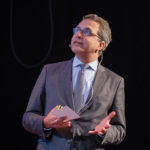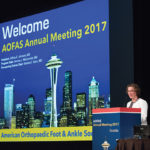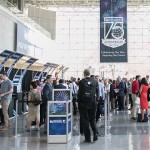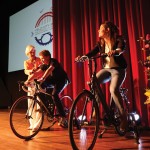
Under the theme “The Forensic Sciences: Founded on Observation and Experience, Improved by Education and Research,” the meeting drew more than 5,000 forensic scientists, medical experts, researchers, and government agents from 68 countries to share the most current information and research in the field. “Five-thousand sixty-five attendees is well over what we expected,” said Sondra Doolittle, AAFS’s meetings and events manager. “[D.C.] is especially popular, because we have a lot of organizations that are located in the Northeast. We expect growth, though we certainly did not expect we would go over 5,000 attendees.”
Challenges
Some of that growth was the result of a surge in the number of individual events held during the conference. Each year AAFS’s Annual Meeting draws participants from more than 200 affiliate organizations, some of which host their own programs and events — 357 in all this year, including board meetings, educational sessions, and receptions. Trying to accommodate so many different events with so many different organizations was certainly a challenge in terms of space and time, but Doolittle found that attendees were willing to be flexible. “A lot of times, especially on our busiest days where we just don’t have space available, we were able to move people to other days when requests would come in,” she said. “We had lots of turns within the meeting space and a lot of things that just ran back-to-back in order to get all of those meetings held.”
AAFS didn’t see a great change in its daily-registration numbers. Rather, it found that its educational programming was the big draw, especially among governmental groups that are located in the D.C. area. “We’re pretty proud that our educational sessions cover such broad topics and technology that it brings so many people to our meeting,” Doolittle said.
Initiatives
Programming received a boost from the Annual Meeting’s theme, which played off AAFS’s celebration of its 65th anniversary. Each year, AAFS’s president selects the conference theme, and 2012-2013 President Robert E. Barsley, DDS, JD, was interested in “historical perspectives” surrounding the forensic study of events such as the Titanic disaster and the sinking of the Confederate submarine H.L. Hunley off the coast of South Carolina in 1864.
“We don’t really solicit a lot of presentations,” Doolittle said, “and we don’t pay speakers to attend in general, and so just [Barsely’s] announcement that he would like to see that type of thing brought in a huge number of experts that we didn’t really know we had.” One of the most popular sessions — an interpretive bus tour focusing on the manhunt for Abraham Lincoln’s assassin, John Wilkes Booth — sold out quickly and had an extensive waitlist because it was limited by the number of attendees who could fit on the bus.
Finding people who could deliver interesting and relevant presentations wasn’t much of a problem for AAFS, which counts among its members some of the preeminent scholars and professionals in forensic science. “Whatever ends up to be our president’s call, we tend to find the experts we need within our organization,” Doolittle said, “or someone knows someone who can provide us with what we need in terms of speakers.”
Convene’s Pre-Con/Post-Con series asks meeting planners about their challenges and how they intend to address them (Pre-Con), and then circles back around after the meeting has occurred (Post-Con) to see how well they worked out.



